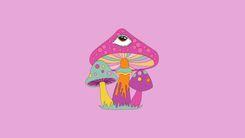Study suggests that the efficacy of psilocybin in the treatment of depression may be overestimated
The study included clinical trials with adults with major depressive disorder (MDD) or treatment-resistant depression (TRD)
Published on 08/27/2025

Illustrative Image: Canva Pro
A recent study published in 2025 in the JAMA Network Open journal brought new evidence on the use of psilocybin, a psychedelic substance derived from mushrooms, in the treatment of depression. The research, which conducted a meta-analysis of 17 randomized clinical trials, compared the results of treatments with psilocybin, esketamine, and selective serotonin reuptake inhibitors (SSRIs).
According to the researchers, patients who received control treatments in psilocybin trials showed significantly less improvement in depressive symptoms than those in the control groups of esketamine or SSRIs studies. While the response to control treatment in psilocybin studies was about 50%, it reached 100% in the SSRIs trials and 112% in the esketamine trials, measured by the Montgomery-Åsberg Depression Rating Scale (MADRS).
Read more
Having difficulty experiencing orgasm? See how cannabis can help
Study shows that cannabis users have enhanced cognitive abilities
Resident of Paraná wins right to grow cannabis at home after 20 years of anxiety crises
Psilocybin has been identified as an innovative antidepressant, with reports of rapid and long-lasting effects, often superior to traditional antidepressants. However, the study highlights that these results may be overestimated. Factors such as functional unblinding - when participants and staff realize which substance is being administered - and high patient expectations regarding psychedelics may have influenced the results.
"The poor results of control treatment in psilocybin trials suggest that its antidepressant efficacy may not be as broad as previously thought," the authors point out. They emphasize that, although psilocybin shows promising effects, the comparison with other treatments, such as SSRIs and esketamine, indicates that the benefits may be more modest than previously reported.
The study included clinical trials with adults with major depressive disorder (MDD) or treatment-resistant depression (TRD), using rigorous meta-analysis methods to compare the effect of active treatment and control groups. Additionally, it was observed that the study population was a significant moderator of the results, indicating that differences may vary depending on the participants' profiles.
The survey reinforces the need for caution in interpreting results from studies with psychedelics and points to the importance of additional research to confirm the efficacy of psilocybin, especially in comparison to established therapies.
Source: JAMA Network Open, 2025.







